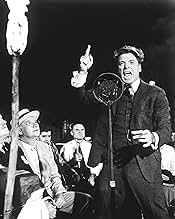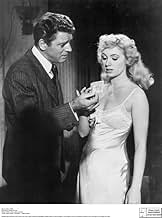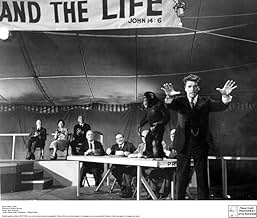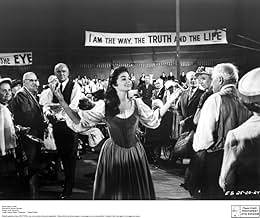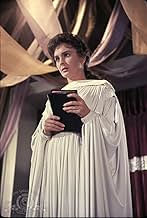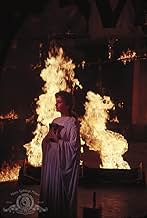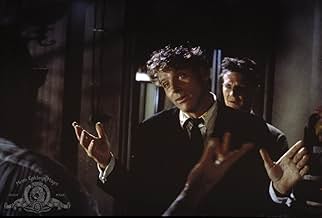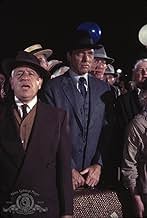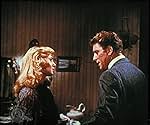IMDb RATING
7.7/10
14K
YOUR RATING
A fast-talking traveling salesman with a charming, loquacious manner convinces a sincere evangelist that he can be an effective preacher for her cause.A fast-talking traveling salesman with a charming, loquacious manner convinces a sincere evangelist that he can be an effective preacher for her cause.A fast-talking traveling salesman with a charming, loquacious manner convinces a sincere evangelist that he can be an effective preacher for her cause.
- Director
- Writers
- Stars
- Won 3 Oscars
- 11 wins & 14 nominations total
Edward Andrews
- George F. Babbitt
- (as Ed Andrews)
Harry Antrim
- Salesman in Saloon
- (uncredited)
Larry J. Blake
- Mac - Bartender
- (uncredited)
Phil Bloom
- Cornerman
- (uncredited)
Paul Bradley
- Congregation Member
- (uncredited)
- Director
- Writers
- All cast & crew
- Production, box office & more at IMDbPro
Featured reviews
"Elmer Gantry" is an amazing film that does not seem dated at all, having lost none of its bite or appeal with the passing of time. Taken from the classic Sinclair Lewis novel of the same name, director Richard Brooks garnered an Oscar for Best Screenplay for his adaptation, and Burt Lancaster won his sole Best Actor Oscar for his performance as Elmer Gantry. Gantry is an over-the-top opportunistic traveling salesman who teams up with evangelist Sister Sharon Falconer (Jean Simmons) to promote religion in 1920's America. Gantry turns out to be the perfect publicity compliment to Sister Sharon, who, unlike him, is a true believer. Where she is quiet and gentle with her manner of preaching, he is all fire and brimstone, literally throwing himself about the audience and inflaming them into repentance.
Burt Lancaster commands the screen: all flashing teeth, athletic energy, charisma, and wild hair, using his own physical prowess to great advantage. The angelic and lovely Jean Simmons, who had legions of adoring male fans when she was in her ethereal prime, portrays Sister Sharon (loosely based on a well-known real-life revivalist of the early 1920's, Aimee Semple McPherson, about whom I'd heard from my grandmother) in a manner reminiscent of her character in "Spartacus" - she was the perfect choice for this role, as was Lancaster for his.
Shirley Jones was awarded the Best Supporting Actress Oscar for her lively portrayal of prostitute Lulu Bains, whose past history with Gantry comes back to haunt him, with some of the best lines in the film - gleefully laughing as she dances about a room full of her fellow prostitutes, she recounts that "He rammed the fear of God into me so fast I never heard my old man's footsteps!" Watching Burt Lancaster in his prime use his athletic ability (he was a circus acrobat before he became an actor) and physical grace helps make his performance truly electrifying. And he also manages to believably evolve Elmer Gantry from loud-mouthed salesman to a sympathetic and honest human being over the course of the film.
The top-notch supporting cast includes Arthur Kennedy, Patti Page, Dean Jagger, and John McIntire.
Burt Lancaster commands the screen: all flashing teeth, athletic energy, charisma, and wild hair, using his own physical prowess to great advantage. The angelic and lovely Jean Simmons, who had legions of adoring male fans when she was in her ethereal prime, portrays Sister Sharon (loosely based on a well-known real-life revivalist of the early 1920's, Aimee Semple McPherson, about whom I'd heard from my grandmother) in a manner reminiscent of her character in "Spartacus" - she was the perfect choice for this role, as was Lancaster for his.
Shirley Jones was awarded the Best Supporting Actress Oscar for her lively portrayal of prostitute Lulu Bains, whose past history with Gantry comes back to haunt him, with some of the best lines in the film - gleefully laughing as she dances about a room full of her fellow prostitutes, she recounts that "He rammed the fear of God into me so fast I never heard my old man's footsteps!" Watching Burt Lancaster in his prime use his athletic ability (he was a circus acrobat before he became an actor) and physical grace helps make his performance truly electrifying. And he also manages to believably evolve Elmer Gantry from loud-mouthed salesman to a sympathetic and honest human being over the course of the film.
The top-notch supporting cast includes Arthur Kennedy, Patti Page, Dean Jagger, and John McIntire.
I just spend two days at my best friends' home for his father's funerals, and during the obligatory moments of life contemplation, we were wondering what was awaiting us all. I guess it's hard to imagine that your beloved one has faded into nothingness, so religion brings you a certain psychological comfort in knowing that there's such a thing as a soul and that, depending on a man's life, it gets the treatment it deserves. Yes, sir-ree, it might feel simplistic but at least it's fair and square.
I think this logic might explain why revivalism is so fervent in America, most of the small-town folks wouldn't fancy an alternative to an after-world where the good isn't rewarded and the evil punished, God fabricated men in its own image so it's only fair that men built a society that works in the same way than God, even if God can act in mysterious ways... let's face it, even the most sophisticated ones of us wouldn't figure out a universe where religion, as complex as it is, wouldn't be easy to "pitch", no matter how tempting agnosticism could be.
This is why promoting revivalism in the hearts of Americans isn't the most difficult thing to operate, it all comes down to telling people that they're going to burn in hell if they sin and to save their souls if they repent, people are ready to hear that if the words come from the right mouths, it's like a good cop/bad cop routine. In Richard Brooks' "Elmer Gantry", adapted from the novel of the same name by Sinclair Lewis, the good cop is Jean Simmons as Sister Sharon Falconer, a saintly revivalist who talks in sweet and delicate prose, and handles her followers and her endeavor like a businessman would do, and there's the bad cop, but one hell of a smooth-talker named Elmer Gantry.
In the original novel, he was an ordained Minister, in the film, in order to appease the Hays Code, he's an ex-Bible salesman who learned the voices of Gospel from scratch and is capable to infuse Bible passages in every monologue, with a grin that would convince the devil himself to sing Halleluiah. To call Gantry charismatic is an understatement, the casting of Burt Lancaster is perfect if only for providing him that irresistible smile, one so charming that it can get away with the scariest threats or allow an improvised line about love to become his catchphrase and play like a running gag all through the film.
What works even better in Lancaster's performance is that his intents are rarely clear and a big cloud of mystery floats around his solid shoulders. His character-establishing moment occurs when he convinces a bunch of drunkards to give charity money to old Christian ladies during a Xmas celebration. With his smile, he manages to skim money off a few piles without even asking, working like the gangster who'd get anything with a smile rather than a threat. Before, he was telling naughty jokes and after, he would have sex with Lulu Baines (Shirley Jones), a hooker who couldn't resist his words, a move that would backfire at him later. Gantry is irresistible indeed, but he's a swindler and I'd say about him what I say about Fellini's "Bidone", before you find them sympathetic, keep in mind it's part of their job.
So Gantry drifts from a place to another until he meets Sister Shara and has an epiphany. He cons her into believing he can attract the crowds with a "saved salesman" speech, Gantry brings crowds indeed and makes arrangements with Zenith church leaders, convincing her that religion must be a spectacle and must bring money in order to survive, and then we get to a second act where it's all about the spectacular improvisation of Lancaster and the professional talent of Simmons, religion turns out to be a big circus, where even the enthusiasm of the audience is part of the show. Lancaster and Jones won the Oscar but Jean Simmons was sure robbed of a nomination and even Arthur Kennedy as the no-nonense big-city reporter Lefferts had a few interesting sequences as the man of reason in the midst of that huge cacophony.
Yes, because there's a lot of noise in the film and this is why it never ceases to be entertaining, so many speeches like a "Network" of the 60s, the noise of religious frenzy, of media craving for sensationalism, of cheering and booing, of "Glory Glory Halleluiah", the film was directed the same year than "Inherit the Wind" but the handling of religion and religious figures is in such a hyperbolic way we might suffer from dizziness, especially when romantic feelings get mixed up and the film culminates with a third act where the ugliness implodes on everyone, what goes around...
This all leads to the inevitable confrontation between good ol' truth and ol' time religion... but the film (like "Inherit the Wind") tries to give the two sides a fair trial, even avoiding to make a total scam out of Gantry and keep him sympathetic even when he's truly guilty of manipulation. But isn't it all about manipulation after all? Media, businessmen, corporations, public opinion, religion, are all institutions guided by noble intentions but that couldn't keep on going without money. Some things exist because they have to... and because they need to exist must count on the shadiest ambassadors, ironically, Gantry was the most human of all, especially with his weakness for a good drink.
The film explores all the facets and allows each side to be given a fair treatment but it also shines by its punchy script, gutsy approach and an unforgettable performance by Burt Lancaster aka "The Grin", a hard-drinking fellow who embodied an aspect of religion that can echo Homer's statement about alcohol as the cause and the solution to all men's problem. Cheers!
I think this logic might explain why revivalism is so fervent in America, most of the small-town folks wouldn't fancy an alternative to an after-world where the good isn't rewarded and the evil punished, God fabricated men in its own image so it's only fair that men built a society that works in the same way than God, even if God can act in mysterious ways... let's face it, even the most sophisticated ones of us wouldn't figure out a universe where religion, as complex as it is, wouldn't be easy to "pitch", no matter how tempting agnosticism could be.
This is why promoting revivalism in the hearts of Americans isn't the most difficult thing to operate, it all comes down to telling people that they're going to burn in hell if they sin and to save their souls if they repent, people are ready to hear that if the words come from the right mouths, it's like a good cop/bad cop routine. In Richard Brooks' "Elmer Gantry", adapted from the novel of the same name by Sinclair Lewis, the good cop is Jean Simmons as Sister Sharon Falconer, a saintly revivalist who talks in sweet and delicate prose, and handles her followers and her endeavor like a businessman would do, and there's the bad cop, but one hell of a smooth-talker named Elmer Gantry.
In the original novel, he was an ordained Minister, in the film, in order to appease the Hays Code, he's an ex-Bible salesman who learned the voices of Gospel from scratch and is capable to infuse Bible passages in every monologue, with a grin that would convince the devil himself to sing Halleluiah. To call Gantry charismatic is an understatement, the casting of Burt Lancaster is perfect if only for providing him that irresistible smile, one so charming that it can get away with the scariest threats or allow an improvised line about love to become his catchphrase and play like a running gag all through the film.
What works even better in Lancaster's performance is that his intents are rarely clear and a big cloud of mystery floats around his solid shoulders. His character-establishing moment occurs when he convinces a bunch of drunkards to give charity money to old Christian ladies during a Xmas celebration. With his smile, he manages to skim money off a few piles without even asking, working like the gangster who'd get anything with a smile rather than a threat. Before, he was telling naughty jokes and after, he would have sex with Lulu Baines (Shirley Jones), a hooker who couldn't resist his words, a move that would backfire at him later. Gantry is irresistible indeed, but he's a swindler and I'd say about him what I say about Fellini's "Bidone", before you find them sympathetic, keep in mind it's part of their job.
So Gantry drifts from a place to another until he meets Sister Shara and has an epiphany. He cons her into believing he can attract the crowds with a "saved salesman" speech, Gantry brings crowds indeed and makes arrangements with Zenith church leaders, convincing her that religion must be a spectacle and must bring money in order to survive, and then we get to a second act where it's all about the spectacular improvisation of Lancaster and the professional talent of Simmons, religion turns out to be a big circus, where even the enthusiasm of the audience is part of the show. Lancaster and Jones won the Oscar but Jean Simmons was sure robbed of a nomination and even Arthur Kennedy as the no-nonense big-city reporter Lefferts had a few interesting sequences as the man of reason in the midst of that huge cacophony.
Yes, because there's a lot of noise in the film and this is why it never ceases to be entertaining, so many speeches like a "Network" of the 60s, the noise of religious frenzy, of media craving for sensationalism, of cheering and booing, of "Glory Glory Halleluiah", the film was directed the same year than "Inherit the Wind" but the handling of religion and religious figures is in such a hyperbolic way we might suffer from dizziness, especially when romantic feelings get mixed up and the film culminates with a third act where the ugliness implodes on everyone, what goes around...
This all leads to the inevitable confrontation between good ol' truth and ol' time religion... but the film (like "Inherit the Wind") tries to give the two sides a fair trial, even avoiding to make a total scam out of Gantry and keep him sympathetic even when he's truly guilty of manipulation. But isn't it all about manipulation after all? Media, businessmen, corporations, public opinion, religion, are all institutions guided by noble intentions but that couldn't keep on going without money. Some things exist because they have to... and because they need to exist must count on the shadiest ambassadors, ironically, Gantry was the most human of all, especially with his weakness for a good drink.
The film explores all the facets and allows each side to be given a fair treatment but it also shines by its punchy script, gutsy approach and an unforgettable performance by Burt Lancaster aka "The Grin", a hard-drinking fellow who embodied an aspect of religion that can echo Homer's statement about alcohol as the cause and the solution to all men's problem. Cheers!
From the exceptionally talented pen of noted author Sinclair Lewis comes this entertaining story of a fast-talking, yarn-spinning vacuum salesman with the natural gift of persuasion. In his ever lustful sights is a voluptuous female preacher. In order to conquer her, he must use his extensive repertoire of biblical quips, quotes and bawdy antidotes. Within the sphere of a traveling troupe of bible beating, evangelicals on a religious crusade, the author's hero, one Elmer Gantry (supurbly played by Oscar wining Burt Lancaster) is as energetic as his tales. Although it's difficult to know if Gantry's spiritual motivation is genuine or merely a ploy, throughout the film, one is kept guessing. The target of his earthly desires is Beautiful Sister Sharon Falconer (Jean Simmons) a sincere, but fallible woman out to build a ministry. A serious obstacle to her goal is Gantry, but more so is the cautionary and caustic pen of Jim Lefferts (Arthur Kennedy), a Pulitzer Prize winning journalist who questions the personal and financial motives of her entourage. Her main supporter is worldly William Morgan (Dean Jagger) who believes in Falconer, and sees Gantry and Lefferts for the opportunistic impediments they are. The film is a triumph for Lancaster and Kennedy and for all those who wish to visit a confusing period of Americanna, when the word of God was infected by preachers, pushers and spiritual leeches. ****
For some reason Richard Brooks seemed to think of himself as the man best suited to turning great novels and plays into films, but if the results were at best entertaining ("The Brothers Karamazov", "Cat on a hot tin roof") they tended to fall far short of the originals. If "Elmer Gantry" worked better than most was largely due to Brooks ability to tell a rattling good yarn at a cracking pace and to the performances of a superb cast.
Burt Lancaster seemed born to play the role of the lustful traveling salesman whose desire for the Aimee Semple McPhearson-like Sister Sharon turns him into a charismatic preacher, (his performance here is a virtual reprise of his performance as Starbuck in "The Rainmaker" a few years earlier). As Sharon, Jean Simmons gives a luminous performance, all fragility and repressed sexuality and singer Shirley Jones is a revelation as a trampy prostitute; (both she and Lancaster were rewarded with Oscars). Not great then, but several cuts above what it might have been.
Burt Lancaster seemed born to play the role of the lustful traveling salesman whose desire for the Aimee Semple McPhearson-like Sister Sharon turns him into a charismatic preacher, (his performance here is a virtual reprise of his performance as Starbuck in "The Rainmaker" a few years earlier). As Sharon, Jean Simmons gives a luminous performance, all fragility and repressed sexuality and singer Shirley Jones is a revelation as a trampy prostitute; (both she and Lancaster were rewarded with Oscars). Not great then, but several cuts above what it might have been.
Elmer Gantry the novel came out in 1925 and it took 35 years to get it to the screen. But it certainly was worth the wait. The movie provided Burt Lancaster, Shirley Jones, and Richard Brooks all with Oscars and it has become a classic. But we sure view it differently 80 years after the book and 55 years after the movie debuted.
Inherit the Wind and Elmer Gantry came out in the same year and both were set in the Twenties. Both dealt with fundamentalist religion and the power it held. Both films got Oscar nominated for best film and for Best Actor for it's first billed male player.
In 1960 when you saw both films they were viewed as tales of a bygone era. Evangelists like Elmer Gantry and Sister Sharon Falconer have the kind of power that thankfully we don't give the fundamentalist community now. Even seeing film clips of Billy Sunday and Aimee Semple McPherson, they seemed quaint and old fashioned. Fortunately we'd outgrown the nonsense of that era.
But Sinclair Lewis proved to be a prophet. No one could ever have dreamed in 1960 that fundamentalist Christians would have the political power they do today. What Lewis if he were alive today would do with Pat Robertson, Jerry Falwell, John Hagee and the rest of that crowd would really be something. Elmer Gantry is alive and well. Some might even call it a resurrection.
And Elmer's a part that comes once in a lifetime to a player. Liar, conman, womanizer and likable on top. You've got to be a real extrovert to play that part. So Richard Brooks got perhaps one of the biggest extroverts ever to hit Hollywood.
Burt Lancaster was born to play Gantry, in fact he'd had something of a dress rehearsal in the part in The Rainmaker. During those sermon scenes, some of which are taken from Billy Sunday's actual sermons, you know he's giving out with nonsense and you still get taken in by his charm. Note the relationship between Lancaster and agnostic reporter Arthur Kennedy. Kennedy knows he's a conman, but still they get along just great.
It was a shame that Jean Simmons was neglected by the Academy for her portrayal of Sharon Falconer. Sharon is a true believer, but she's also a romantic as the real Aimee Semple McPherson was. And the woman had needs which Elmer is only too glad to fulfill.
The real Aimee was also an outrageous character herself, but I believe a decent soul at heart. During the Depression, her tabernacle set up a soup kitchen that fed thousands. In fact Anthony Quinn, growing up in Los Angeles at the time, recalled in his memoirs working for his and his family's supper as a volunteer there. Quinn had nothing but praise for Aimee, she was the difference in whether his family ate or not on many a day.
Shirley Jones got a career salvation with her Oscar winning role as Lulu Baines, prostitute who's out for vengeance. A fine singer, she came along unfortunately when musicals were winding down. That Oscar for Best Supporting Actress insured a continuing career for her.
Arthur Kennedy as the investigative reporter is whose perspective we view the film from. He'd had five trips to the Oscar World Series without a victory, might have been nice if this one had been a sixth. His is the voice of reason, of true compassion, of truth in fact the voice of Sinclair Lewis himself.
Another of Sinclair Lewis's great characters, George F. Babbitt, makes an appearance. Edward Andrews got probably his career part as Babbitt, hypocritical businessman to the max. He was as born to play Babbitt as Lancaster was to play Gantry. He could also have been given an Oscar nomination.
Elmer Gantry is a great film, a prophetic film, proving it sure can happen here.
Inherit the Wind and Elmer Gantry came out in the same year and both were set in the Twenties. Both dealt with fundamentalist religion and the power it held. Both films got Oscar nominated for best film and for Best Actor for it's first billed male player.
In 1960 when you saw both films they were viewed as tales of a bygone era. Evangelists like Elmer Gantry and Sister Sharon Falconer have the kind of power that thankfully we don't give the fundamentalist community now. Even seeing film clips of Billy Sunday and Aimee Semple McPherson, they seemed quaint and old fashioned. Fortunately we'd outgrown the nonsense of that era.
But Sinclair Lewis proved to be a prophet. No one could ever have dreamed in 1960 that fundamentalist Christians would have the political power they do today. What Lewis if he were alive today would do with Pat Robertson, Jerry Falwell, John Hagee and the rest of that crowd would really be something. Elmer Gantry is alive and well. Some might even call it a resurrection.
And Elmer's a part that comes once in a lifetime to a player. Liar, conman, womanizer and likable on top. You've got to be a real extrovert to play that part. So Richard Brooks got perhaps one of the biggest extroverts ever to hit Hollywood.
Burt Lancaster was born to play Gantry, in fact he'd had something of a dress rehearsal in the part in The Rainmaker. During those sermon scenes, some of which are taken from Billy Sunday's actual sermons, you know he's giving out with nonsense and you still get taken in by his charm. Note the relationship between Lancaster and agnostic reporter Arthur Kennedy. Kennedy knows he's a conman, but still they get along just great.
It was a shame that Jean Simmons was neglected by the Academy for her portrayal of Sharon Falconer. Sharon is a true believer, but she's also a romantic as the real Aimee Semple McPherson was. And the woman had needs which Elmer is only too glad to fulfill.
The real Aimee was also an outrageous character herself, but I believe a decent soul at heart. During the Depression, her tabernacle set up a soup kitchen that fed thousands. In fact Anthony Quinn, growing up in Los Angeles at the time, recalled in his memoirs working for his and his family's supper as a volunteer there. Quinn had nothing but praise for Aimee, she was the difference in whether his family ate or not on many a day.
Shirley Jones got a career salvation with her Oscar winning role as Lulu Baines, prostitute who's out for vengeance. A fine singer, she came along unfortunately when musicals were winding down. That Oscar for Best Supporting Actress insured a continuing career for her.
Arthur Kennedy as the investigative reporter is whose perspective we view the film from. He'd had five trips to the Oscar World Series without a victory, might have been nice if this one had been a sixth. His is the voice of reason, of true compassion, of truth in fact the voice of Sinclair Lewis himself.
Another of Sinclair Lewis's great characters, George F. Babbitt, makes an appearance. Edward Andrews got probably his career part as Babbitt, hypocritical businessman to the max. He was as born to play Babbitt as Lancaster was to play Gantry. He could also have been given an Oscar nomination.
Elmer Gantry is a great film, a prophetic film, proving it sure can happen here.
Did you know
- TriviaWhen he first learned that Richard Brooks was interested in adapting his novel, Sinclair Lewis told him that he should change it significantly, advising him to read all the criticisms of the book and use them as a way to improve on it.
- GoofsThe location where Sister Sharon confronts the police captain and fire chief over erecting her tent is purported to be in Lincoln Nebraska. The opening part of the scene shows mountains in the background. There are no mountains around Lincoln.
- Quotes
Lulu Bains: Oh, he gave me special instructions back of the pulpit Christmas Eve. He got to howlin' "Repent! Repent!" and I got to moanin' "Save me! Save me!" and the first thing I know he rammed the fear of God into me so fast I never heard my old man's footsteps!
- Crazy creditsScrolled before the opening credits: "We believe that certain aspects of Revivalism can bear examination- that the conduct of some revivalists makes a mockery of the traditional beliefs and practices of organized Christianity! We believe that everyone has a right to worship according to his conscience, but- Freedom of Religion is not license to abuse the faith of the people! However, due to the highly controversial nature of this film, we strongly urge you to prevent impressionable children from seeing it!"
- ConnectionsFeatured in Hollywood: The Fabulous Era (1962)
- SoundtracksI'm On My Way to Canaan Land
(uncredited)
Traditional
Arranged by Mahalia Jackson
Sung by Patti Page and the audience at a revival meeting
Reprised by her at the end
- How long is Elmer Gantry?Powered by Alexa
Details
- Release date
- Country of origin
- Language
- Also known as
- Elmer Gantry, ni bendito ni maldito
- Filming locations
- Production company
- See more company credits at IMDbPro
Box office
- Budget
- $3,000,000 (estimated)
- Gross worldwide
- $64
- Runtime2 hours 26 minutes
- Aspect ratio
- 1.66 : 1
Contribute to this page
Suggest an edit or add missing content

Top Gap
By what name was Elmer Gantry, le charlatan (1960) officially released in India in English?
Answer

